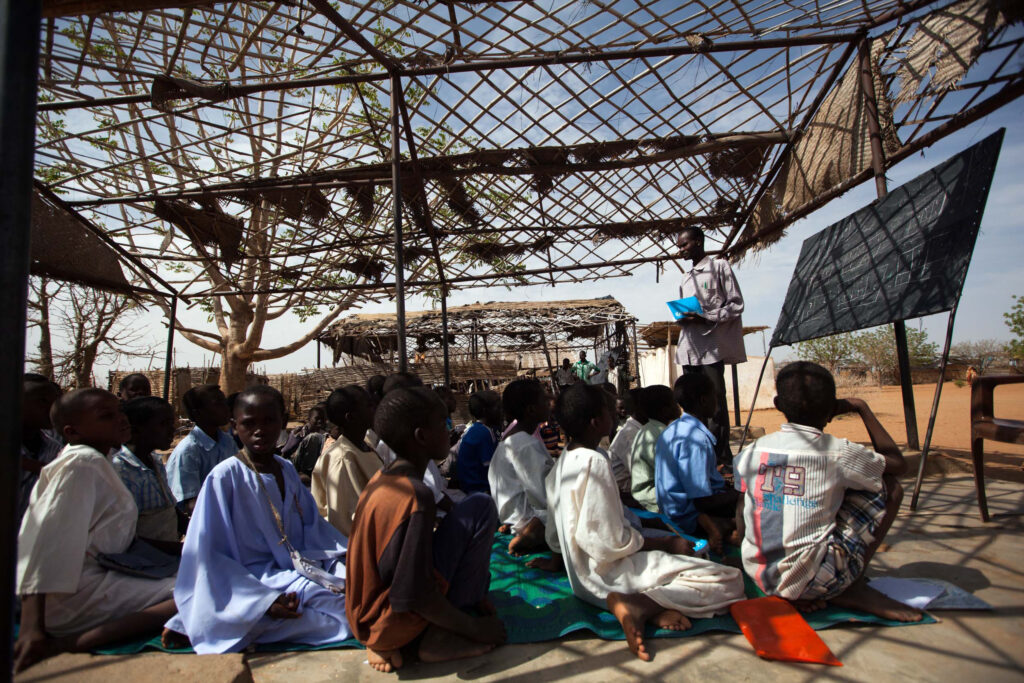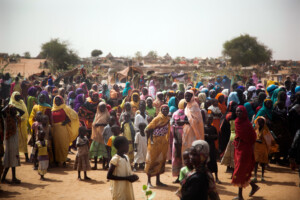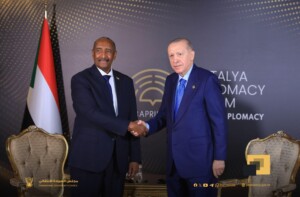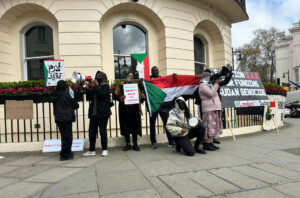‘19 million children in Sudan are out of school’ says UNICEF

Makeshift classroom for newly displaced children in Nyala (File Photo: Albert Gonzalez Farran / UNAMID)
An estimated 19 million children are out of school as the war continues in Sudan, UNICEF said yesterday. Meanwhile, as more than 5.5 million children living in areas less affected by the war wait, local authorities have not yet confirmed whether public classrooms can reopen.
In its latest report, UNICEF said that 6.5 million people have lost access to school due to increasing violence and insecurity in their area, with at least 10,400 schools closed in conflict-affected areas.
Before the conflict erupted in April, some seven million children were out of school, and if the war continues, “no child in Sudan will be able to return to school” in the coming months. Experts warn of many immediate and long-term risks, including displacement, recruitment by armed groups, and sexual violence.
“Sudan is on the verge of becoming home to the world’s worst education crisis,” Mandeep O’Brien, UNICEF Representative in Sudan, said.
“Children have been subjected to the horrors of war for almost half a year. Now that they have been forced away from their classrooms, teachers, and friends, they risk falling into a vacuum that will threaten the future of an entire generation.”
October reopening
The acting Council of Ministers in Port Sudan on Saturday directed the resumption of studies in universities and schools “in safe areas” no later than the end of October.
Osman Hussein, acting Minister of Cabinet Affairs in charge of carrying out the duties of the Prime Minister, directed the opening of universities and schools in the states “where security conditions allow for this”.
Universities and colleges are set to resume their studies in mid-October, as per the direction of the acting Minister of Higher Education and Scientific Research, Mohamed Dahab.
Director of the Education Sector in Red Sea state, Hashim Eisa, said he will meet with the departments of primary, intermediate, and secondary education to discuss the possibility of resuming classes in the end of October.
He warned of a shortage of seats and textbooks, stressing that they are working with the available resources, and did not rule out resorting to a two-shift system in one school in the event of a significant increase in the number of students.
Five schools in Port Sudan are used as shelters, but plans are in motion to relocate residents a week before the start of the resumption of classes.
Disagreements
Many different parties have criticised the decision to reopen schools in light of mass displacement and asylum-seeking, in addition to the presence of students and professors in war zones and their inability to leave them.
The Kassala Teachers’ Committee announced its categorical rejection of the decision to resume classes under the current circumstances.
Sayed Tomba, head of the committee, told Radio Dabanga that they would not allow schools to start because teachers’ salaries had not been paid for over six months.
“In the city of Kassala, 57 schools have been turned into shelters for people who fled Khartoum, and we are expecting the number to increase.” He called on the authorities to pay the teachers’ salaries and on organisations to provide schools with resources to function.
‘Favouritism‘
The Sudanese Teachers’ Committee as well rejected the decision to resume studies in safe areas, calling it “an entry point to divide Sudan” in a press statement yesterday. They scorned the non-payment of teachers’ salaries, the transformation of schools into shelters, and the lack of essential educational resources.
“This decision demonstrates unacceptable favouritism towards those who are able to continue education, without accounting for the wide spectrum of Sudanese people who will not be able to return to school.”
They indicated their suspicion of “courtesy and collusion with the owners of private schools, who have transferred their activities to safe states or outside Sudan, leading to the expansion of private education at the expense of public education”.
Hisham El Nour, lecturer at El Nileen University, commented to Radio Dabanga that the decision to resume and stop studies concerns the university councils and “not any other party”.
Deputy Special Representative for the UN Secretary-General and Humanitarian Coordinator for Sudan Clementine Nkweta-Salami said In a statement to the press last week: “I have met families sleeping in makeshift shelters, struggling to find food and water, unable to access health care, their children out of school and the family breadwinners out of work.”











 and then
and then